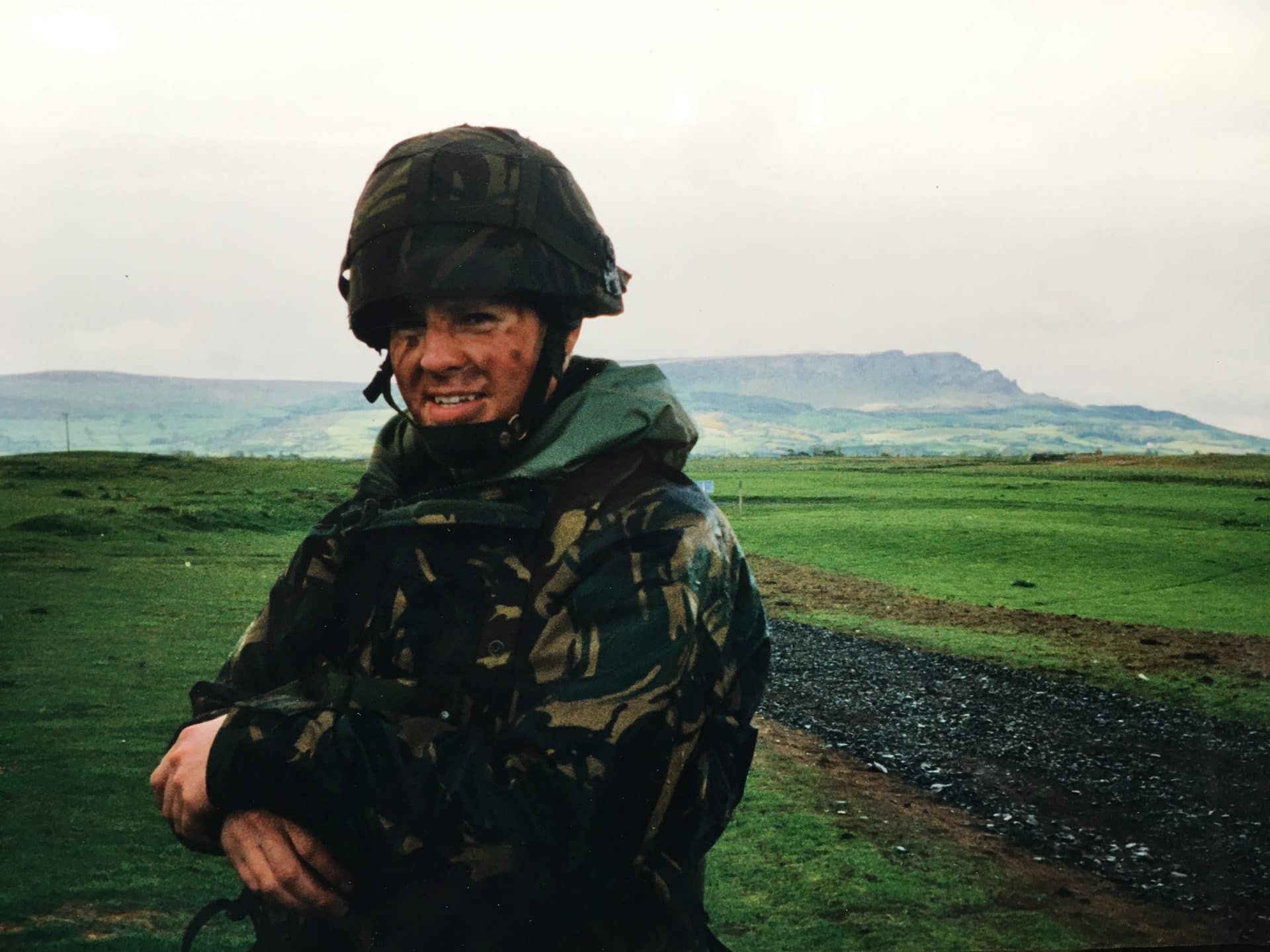Finding Opportunity in Adversity – A Military Mental Health story
Mental Health
John Watson Allison writes powerfully about life in the British Army, the mental health challenges he faced when he became a civilian, and how he now uses his experiences to help others overcome adversity.
Many people, including me of course, have been tested these past few months with the Covid-19 pandemic. It’s rare that we’re collectively subjected to adversity as a country, as a planet even. When I’m coaching others, we often talk about standing on a beach, the ebbing tide is Covid-19 and as it goes out, rocks are being exposed on the shore. The rocks are our vulnerabilities, our shortfalls. While this may sound counterintuitive, we can embrace these rocks, they are valuable. They often indicate where we need to upskill, to acquire new knowledge, understanding and training. In effect they are signposting us to where we need to go next. Eventually the tide will return and hide these rocks. As lockdown eases here in the UK it’s important that we don’t miss the lessons that we can learn, the signs showing us the way. Life is like the tide, it ebbs and flows, in the good times our rocks are hidden by the tide, in the tough times they are revealed. If we are to be prepared for the ebbing tide, the lean times in life, it’s important that we learn from our experience of adversity.
I’d served with the British Army for 24 years and officially retired in January 2012. The Armed Forces had long been my calling, it was more than a job, it was family and a passion too. As a child I’d been running around Dartmoor in military surplus clothing long before I joined up. When I was 14 I’d been an Air Cadet with 303 (Worksop) Detached Flight, Air Training Corps, which proved to be a fantastic introduction to forces life. I’d also had a healthy interest in making homemade fireworks in my early teens. This served me well when I later trained and deployed as a Royal Engineers bomb disposal operator.
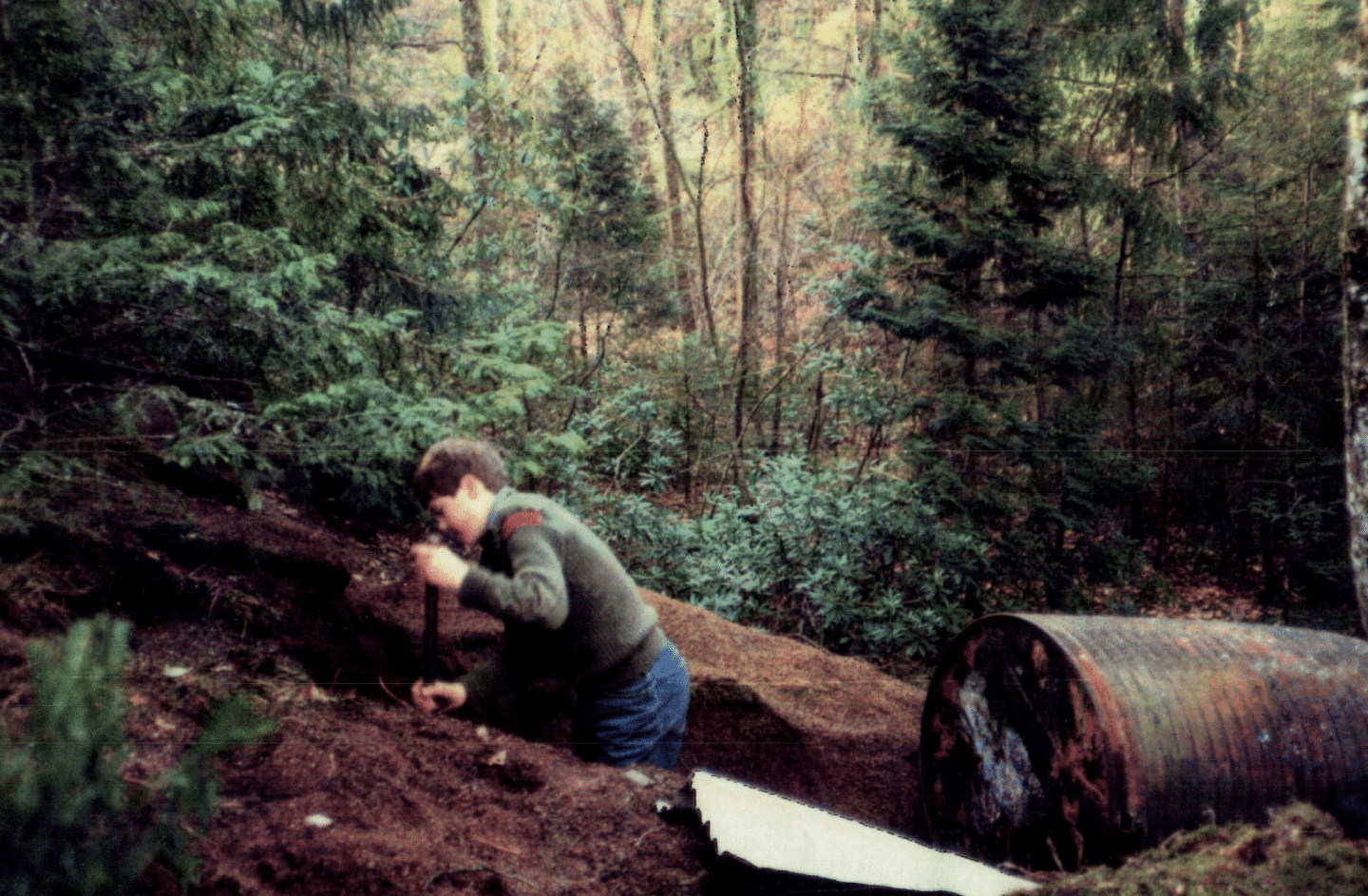
Digging in, aged 14, preparing a shelter in the woods at my grandfathers place on the edge of Dartmoor in Devon. I’d acquired some old metal water tanks and was busy trying to conceal them. Remarkably the shelter is still there today and it’s still warm and dry, some 36 years later.
I thrived in the military, joining at 16, volunteering for most of my deployments abroad and some incredible Adventure Training opportunities in places like the Antarctic, Alaska, the French Alps and Italian Dolomites. There are many incredible opportunities in the Army, all you have to do is step forward and embrace them. I’d also met some remarkable senior leaders who’d placed their trust and faith in me at early stages of my career, sending me off on expeditions halfway around the world. I’ll never forget those people and their values.
I chose to leave of my own accord, after 24 years of service, deciding that it was time to change tack and try something new. At that time I personally had no idea just how challenging I’d find my new life in civvy street. Most service-leavers fare extremely well when leaving the military of course, however, there are exceptions and we must be prepared and equipped to support them.
Around October 2013 the wheels on my new civilian journey started wobbling. I’d been self-employed for a few months. My father had sent me a paper cutting about the work that a London agency were doing in the wellbeing space and that sparked my interest and initial approach to them. I become their in-house, part-time physical trainer which was a fantastic job. The world of self-employment however, tax returns and self- marketing was a very alien one and I didn’t really know what I was doing or trying to achieve. To compensate, I tried to use brute force, man up, crack on….often working into the early hours of the morning, testing the water, trying to make things work and dumping fuel in the process.
What I didn’t realise, was that I was burning myself out. Our bodies are batteries and if we continually discharge that battery without recovery and recharging, something will break and in my case it did. At the time I didn’t recognise the emotional, mental and physical signs that my lifestyle, my behaviour, my thoughts, simply weren’t serving me. The day you acquire that awareness and realise that what you’re doing isn’t supporting or sustaining you, is the moment that you can begin to take back control.
I started to experience heart palpitations which in turn generated panic attacks. I had no knowledge of what was happening to my mind and body. As a former Royal Engineer bomb disposal officer, I’d reflect on how bizarre it was to be well trained and equipped to deal with unexploded bombs but not catastrophic thinking patterns or what felt like death knell sensations in the body.
I’ll never forget one particular time, I was getting palpitations just before midnight. Panicking and fearing for the worst, for some reason I felt compelled to get out of the house, I took my shoes and socks off and walked on the grass. The damp, cool lawn felt comforting underfoot, a natural method to calm racing mind and tense body. Looking back now I realise that this was a form of grounding or earthing and it really worked, it brought me back into the moment. I’d learn a lot during this phase of my life, ways to calm body and mind, ways to energise too. Much of this learning I share with my clients today.
The physical impact of my maladaptive life strategies and perceptions soon became increasingly apparent, the alarm was starting to sound. On 14 November 2013, my GP referred me to an NHS physiotherapist. Her report states that I’d presented with:
“Numbness felt in middle and index finger, aching and feeling of pressure in the chest, nerve tension from neck.”
Looking back now I realise these were classic signals. I was running hot, a dashboard warning light came on, something had to change. It also highlighted the importance of being self-aware and being able to self-regulate, to down-regulate one’s physiology when we’ve activated our stress response or even up-regulate when we’re feeling low. The feelings of numbness, the feeling of pressure in my chest, the tension in my body were all consistent with an inability to recognise and deal with hyper-arousal and more importantly, the causal factors. It’s no different if you’re sitting at home, hour after hour, in front of your PC, holding tension in your body, compromising breathing patterns and then wondering why you feel so wired and tired at the end of the working day. When I’m working with clients this is something that I now help them to tackle, quickly and effectively.
My quality of life steadily deteriorated. I began sleeping in the back of my van at night, in the Pembury hospital A&E car park in Tunbridge Wells. I thought that the palpitations were a sign of imminent heart attack and my skewed or perhaps logical thinking at the time was that I was better off sleeping outside A&E if the worst should happen. I can laugh about it now but at the time it felt like life preservation. I’d even taken to sleeping in the back of my van rather than in my rented room because I felt safer, probably because I thought I’d be able to get myself to hospital faster. It was like I was still on military duty, primed like a coiled spring, for an emergency call out. My van was parked under a lean- to on the farm and I’d try and sneak back into the house in the morning when nobody could see me, so I wouldn’t be subjected to any awkward questions.
To compound matters, in a highly anxious state, I’d presented myself to A&E on 16 November 2013 at 0152hrs, after one particularly unpleasant bout of palpitations. A junior doctor had taken an ECG, in black biro he wrote the words, “Stress related” on my admission report. During another A&E visit the doctor subsequently interpreted the ECG and later suggested that I might have Brugada or what is sometimes called sudden death syndrome. I had to come to terms with this potential diagnosis for what felt like an eternity, while waiting for confirmatory testing and also wore a Holter Monitor or portable ECG for several days. My Aunt had been born with a heart defect and my brother had passed away very suddenly and unexpectedly on Dartmoor several years previously. I’d also had a friend who’d served in the SAS, he’d gone out for a jog one day and tragically collapsed and died. These unprocessed memories only served to drive and fuel catastrophic thinking.
At the same time I found myself living in a very isolated location, a farmhouse in winter. The farmhouse manager was abroad in South Africa and before she left she’d been incredibly supportive. Unbeknown to her, she’d left a void in my life during those months she was away. The only company I had at night was Logan the Tomcat, he’d scratch on the door, come in and fall asleep on my lap while I was tapping away at the computer in the wee small hours. I now understand why animals can offer such immense comfort. I have one client who wouldn’t be alive today if it wasn’t for his cat.
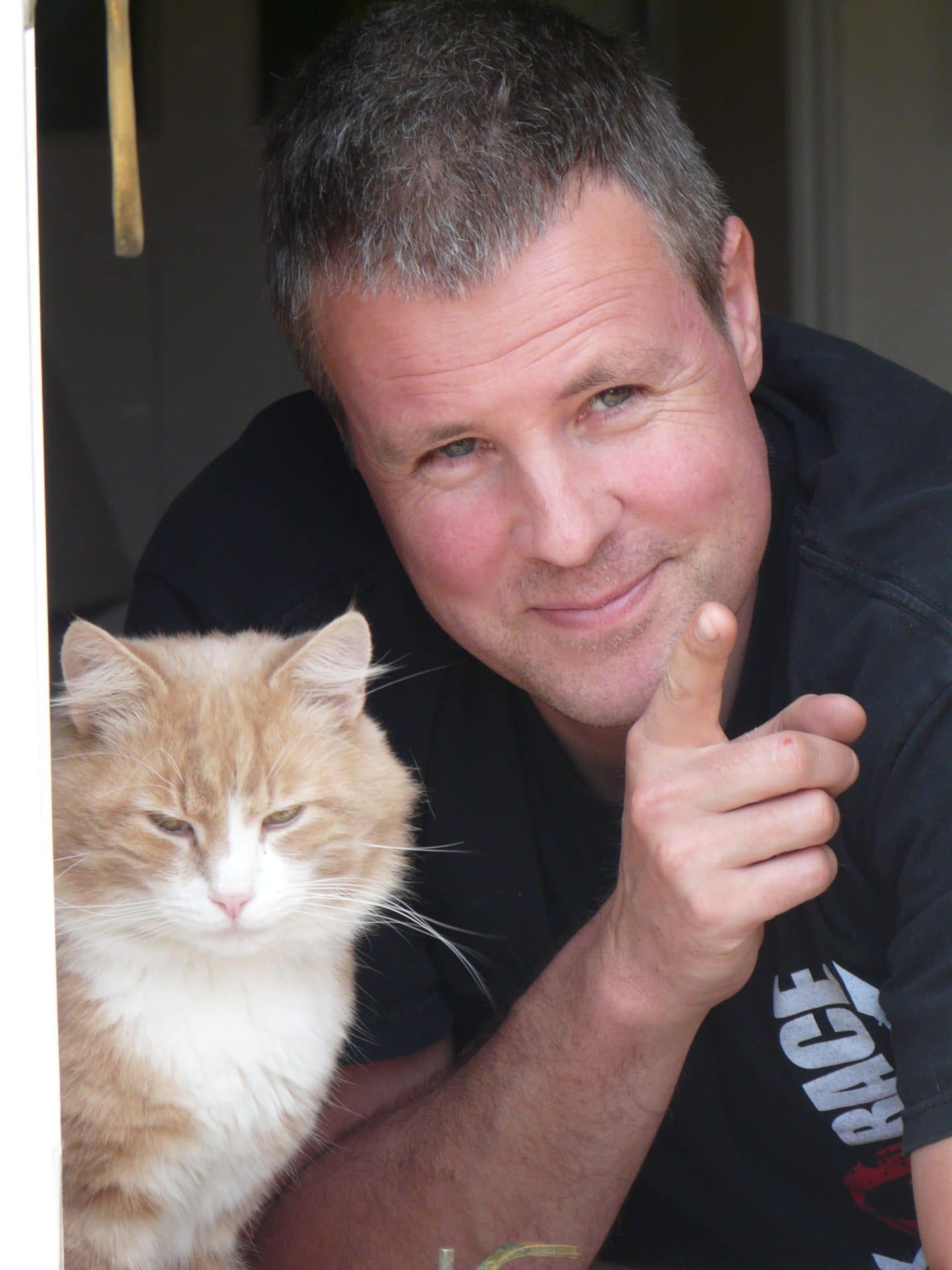
Logan and I discussing the meaning of life. Logan always listened without judgement, he’d give you the occasional friendly nip but I think that was just his way of trying to get his point across. He was genuinely a godsend in the midst of a very challenging time.
After living in a very close community that was the Army for so many years, I hadn’t realised that I was missing real human connection and ultimately I moved to find a new home. Our body-mind often tells us that something has to change….it’s our cue to take positive action. All too often, we try to dampen down the signals or bury our head in the sand, but the problem doesn’t go away.
Then my reservoir of resilience was drained. My father went into hospital for a skin cancer operation just before Christmas in 2013 and that was it, tipping point,…. I had thoughts that I was going to lose the only close family I had left (I’d lost my mother to cancer, my brother to anaphylactic shock) and I didn’t sleep properly for days. There is good reason why sleep deprivation is used as a form of torture, it breaks you down mentally and physically. It keeps you in a state of high anxiety, there’s no respite. At the time I also thought that running up and down hills on an evening would help me get to sleep, all it did was make me more wired. Building and maintaining resilience comes from education, understanding and it takes effort too. We never know what is around the corner in life and therefore we should do all we can to keep our resilience reservoir topped up every single day. Resilience isn’t one thing, it comes from a myriad of factors, your access to community and support networks, your ability to self-regulate, your level of daily physical exercise, mind-set, lifestyle and more.
Eventually I went to see my local and somewhat enlightened GP. Having diagnosed Generalised Anxiety Disorder, she went on to prescribe Diazepam, sleeping tablets and ahead of the curve perhaps, mindfulness and other wellness practices. Looking back now, my situation and symptoms would fit well with Adjustment Disorder too. I’m not a big one for labels, labels are sometimes stuck on, obscuring who the person really is, what they’ve been through and why. On occasion we’ll even begin to adopt that label which doesn’t necessarily help us take some responsibility and move forward. What’s more important in my view, is that you recognise that perhaps your strategies and perceptions haven’t been sustaining or supporting you and therefore it’s time to change. That’s no easy feat for some and that’s why it’s useful to reach out for appropriate help. That help often comes most effectively from peer groups, from those who’ve shared your journey and understand who you really are, what you’ve seen and experienced. Immense value can also be obtained from social prescription too.
I took a few of my Diazepam tablets but eventually threw most of them away. I never took sleeping tablets. I had some CBT for six weeks and counselling with the London Veterans Service (now Op Courage) for a period. I’d been signposted to them by an amazing outreach worker from Combat Stress, sadly he was later made redundant. Little did I know then, I’d later be working with the NHS, Op Courage staff, in a bid to help other veterans. Crucially, I went on to take responsibility for my actions or lack of actions and started to make changes to my lifestyle. Keeping an open mind I read an awful lot, I tried new things and listened attentively to others, extracting tools, ideas and strategies that worked for me. It’s all about building your own personal toolbox, packing your go-bag for that emergency or period of adversity and doing the work that supports and sustains you every single day. I started going into the woods with a DSLR camera whenever I started to feel a little anxious, composing the shot was like observing the principles of rifle shooting, slow down the breathing, focus your attention in the moment, observe the magic of nature, press the shutter, enjoy the results. Old skills re-framed and re- purposed.
I was ultimately tested for Brugada syndrome, it’s called an Ajmaline procedure. Prior to the test I received a copy of my Consultant Cardiologist’s report. He wrote:
“We discussed the possibility of whether this sudden death [my brother Clive, a few years prior] could have been related to Brugada syndrome and at this stage we do not know. We discussed regarding an Ajmaline test….and I discussed with him the implications of having Ajmaline testing, given that he has no surviving siblings and he has no children. I also went through with him the implications of a diagnosis related to going back into the Army [I was keen to join the Army Reserves] and for insurance purposes.”
On 2 December 2014, I was admitted to Maidstone hospital. I remember doing yoga in the hospital grounds, before entering the ward, to calm my racing mind. I also took to watching numerous episodes of Minder on my iPad, if you’re old enough, you may recall the humorous antics and dodgy dealings of Arthur Daley and Terry McCann, it was a welcome diversion. I was eventually wheeled into what looked like a space age operating theatre, a cannula was inserted into my arm and the doctor said, “Are you aware that we may have to restart your heart?”. Yes, once they administer Ajmaline it can cause your heart to stop, “happy days”, I thought!
I ultimately came through this testing period of my life with greater strength, insight, clarity and understanding. There are of course many people who experience far worse situations and go on to thrive. I was lucky, my experiences pale into insignificance when compared with others I’ve worked with, we’re all different and all experience is relevant and valuable. My Ajmaline test proved negative, I subsequently became full-time health and wellbeing manager for the London agency thanks to the wonderful and compassionate head of HR. In January 2017 I went on to set up the website for my own wellbeing service, Motion to MindTM and now help others to develop resources, self- awareness, self-regulation, find clarity and most importantly take action. To me, motion isn’t just physical, it’s metaphorical. Motion is about taking action, not just talking, it’s doing too. It can be a challenge when you’re stuck in a very deep rut,I appreciate that, sometimes you need a helping hand, a guide to get you back on track.
It was alarming to see just how quickly my quality of life deteriorated when multiple plates started to spin. When we don’t take positive action or reach out for help, it’s like a centrifugal force generating momentum, a downward spiral into despair and apathy. You have problems sleeping, you become more wired, you can’t perform at work or in relationships, you worry about your house, your career, your income. The good news is that little positive actions, incremental steps, seeking new knowledge, trying new things, reaching out to others, can slam on the centrifugal brake and begin to quickly propel you back into the green. Reaching out for help takes courage, adapting habits, lifestyles takes recognition and effort of course but one little step can be a game changer.
Life isn’t linear of course and it’s not all roses either. Life continues to be full of unexpected twists and turns for all of us. For me, it’s about doing what we can to be prepared for adversity. In the military we are mandated to be physically and mentally prepared to deploy anywhere in the world at the drop of a hat. If you aren’t, you simply wouldn’t survive the rigours of a high pressure, high threat deployment. I once received a phone call saying that I was to deploy to Baghdad for several months with three days notice. I was catapulted from the relative comfort of a Northern Ireland posting into the apocalyptic chaos and full-blown insurgency, that was Iraq. If I hadn’t been physically and mentally prepared, it would have been a struggle to cope.
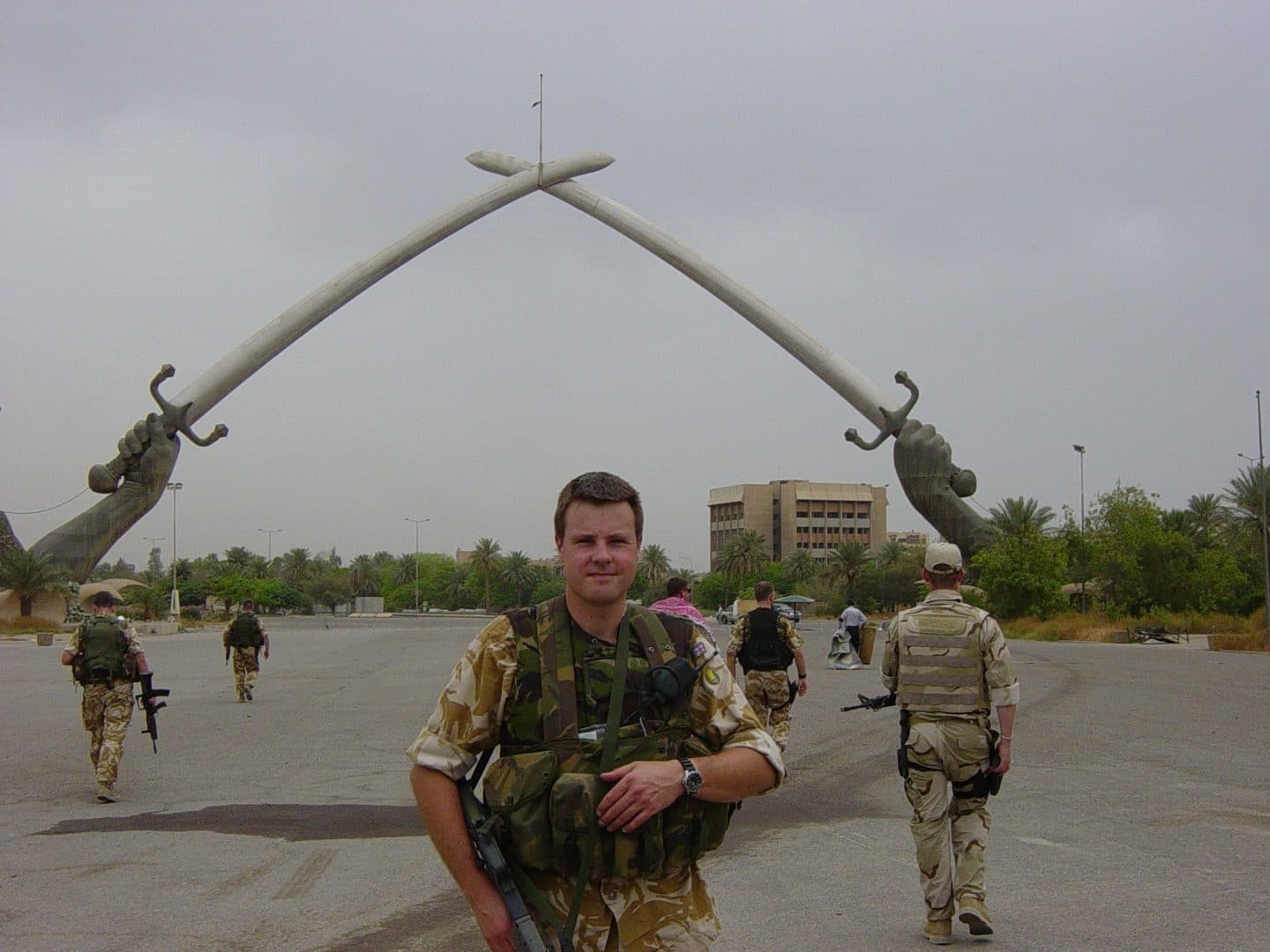
At the Swords of Qādisīyah or “Hands of Victory”, Saddam’s parade ground, Baghdad, Iraq, in 2004.
I’m fortunate to continue to work with some incredible people as a veteran, as a civilian, as a coach with Motion to Mind and StreetGym®. Some of my clients, the people I meet, have been to hell and back. They’ve taught me an awful lot too and I’ll always be learning. I’ve also been very fortunate to work with the NHS, Op Courage team, formally the London Veterans or TILS service. We work with those who may come into contact with veterans in the Criminal Justice System, Police, Magistrates, Prison Officers, providing insight and tools to enable them to make a difference in the lives of those veterans falling on tough times.
When you travel through adversity or challenging times, these times often provide us with the greatest opportunity for learning, clarity and insight. Moreover, such learning and lived experience can provide us with the tools to help others. We must ensure that we’re ready of course, seek to serve others too soon after your own lived experiences and it can be detrimental to you and those you seek to support. When you are ready and comfortable, sharing your story in the appropriate space can be a truly cathartic experience for you and others too.
When we’re actually moving through adversity it can be a challenge to spot opportunity, the opportunity to learn more about ourselves, a time to grab many life lessons and a chance to gain powerful experience that can be re-framed and re-purposed. The Covid-19 pandemic is one such opportunity, an opportunity to reflect, capture lessons, learn, recalibrate, readjust and move forward.
Here’s wishing you and your family all the very best,
John
John Watson Allison FRGS FRSA
Learn more about John’s work at Motion to Mind – enquiries@motiontomind.co.uk
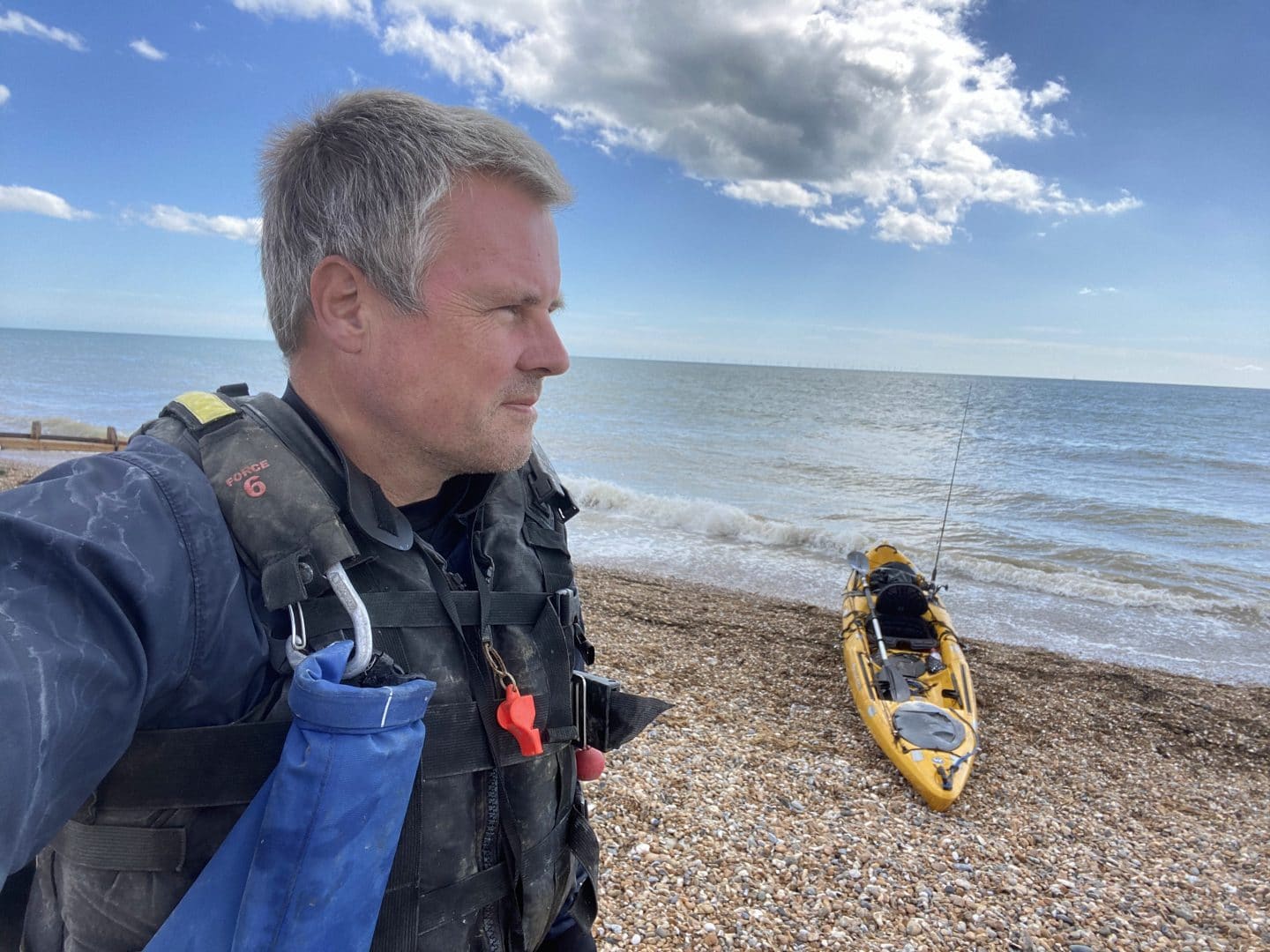

Join The Book of Man
Sign up to our daily newsletters to join the frontline of the revolution in masculinity.




